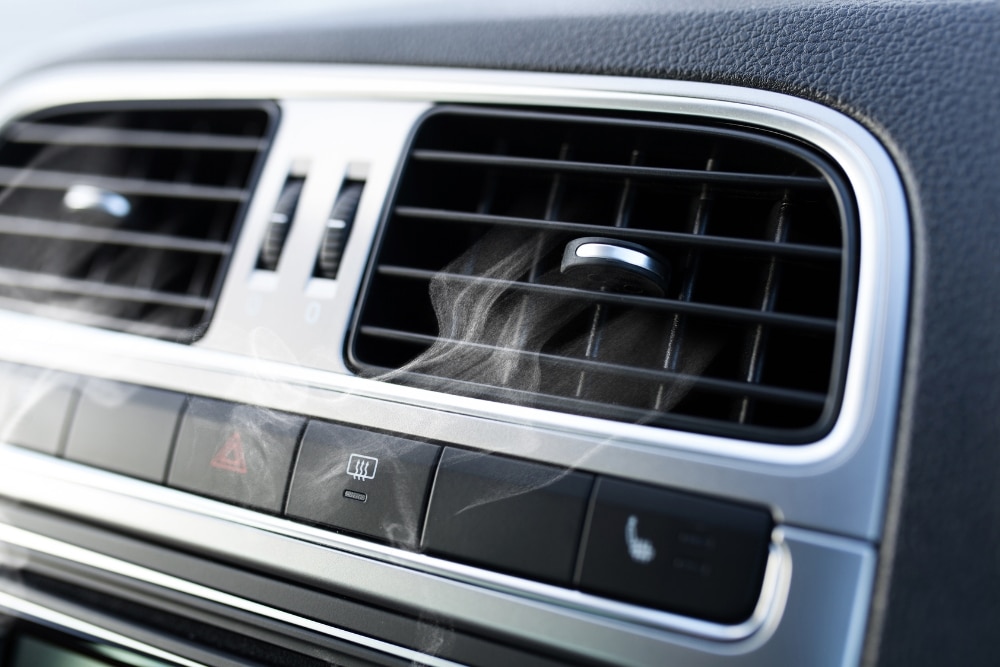If turning on your car’s A/C or heater makes you wrinkle your nose, you’re not just imagining things. At E&G Automotive in Chicopee, we’ve experienced all kinds of strange HVAC smells—from mildew and burning wires to syrupy sweetness. These odors are your car’s way of signaling that something isn’t quite right.
This blog will help you understand what those smells mean, what could be causing them, and what you need to do next. And if you’re a Chicopee driver, you’ll want to pay close attention—your climate system gets a serious workout in Massachusetts weather.
So, what’s that weird smell really telling you?
The Common Culprits Behind Funky A/C Odors
Let’s start by identifying what you might be smelling. Each type of odor gives you a clue into what’s happening deep within your vehicle’s heating and cooling system. Here’s a breakdown of the most common offenders:
Musty or Moldy Smell
Often compared to a damp basement, this usually means there’s moisture buildup somewhere in your A/C system. It’s especially common in systems that haven’t been used in a while or when filters go too long without being changed.
Burning or Smoky Odor
That sharp, acrid smell? It may suggest overheating components or even electrical issues in your blower motor or heating elements. This is one to take seriously.
Sweet, Syrupy Smell
If you’re noticing a sugary, chemical scent, it’s likely coolant leaking into the air system—often from a compromised heater core. This can sometimes fog up your windows or leave a sticky film on the inside of the windshield.
Rotten Egg Smell
It’s unpleasant for a reason. This usually means hydrogen sulfide is leaking from the battery or there’s a problem with your emissions system.
Why Do These Smells Develop in the First Place?
Understanding the cause behind these odors can help you prevent them in the future. These aren’t just random quirks, they’re mechanical red flags.
HVAC Systems Naturally Collect Moisture
Every time you run your A/C, the system condenses moisture from the air. If that moisture doesn’t drain properly, it becomes the perfect environment for mold, mildew, and bacteria to grow.
Cabin Air Filters Work Overtime
Filters trap dust, pollen, road debris, and even air pollutants. But when filters go unchanged, they become clogged and start to smell—sometimes like gym socks, other times like compost. Yikes.
Chemical and Fluid Leaks Can Travel
Your heater and A/C system share air pathways. That means a coolant, oil, or refrigerant leak elsewhere in your car can cause smells that make their way into your cabin vents.
A Closer Look: Your Car’s Climate System is More Complex Than You Think
When you think of your car’s HVAC system, you might imagine just fans and buttons. But in reality, it’s an intricate network of components working together. Here’s a breakdown:
- Evaporator Core: Cools air but also gathers moisture—prime real estate for mold.
- Heater Core: Transfers heat from engine coolant to the cabin. When it leaks, it stinks.
- Blower Motor: Moves air through the vents. Overheating or dust buildup can cause burning smells.
- Cabin Air Filter: Your first line of defense. Old filters don’t just block air—they create bad smells.
- Air Ducts: If any part of the system gets contaminated, the smell flows directly to your face.
That’s why it’s important to have the entire system inspected, not just the part that’s causing the smell.
Think Beyond the Smell: What’s at Stake?
It’s tempting to ignore a weird smell if your car seems to be running fine otherwise. But this kind of symptom is often the tip of the iceberg.
Health Risks
Mold and bacteria in the air system can lead to respiratory issues, allergic reactions, and chronic sinus problems, especially for children or those with asthma.
Comfort and Safety
That foul odor can cause eye or throat irritation and distract you while driving. It’s more than just an inconvenience.
Bigger Problems Down the Line
Something like a leaking heater core doesn’t fix itself. The longer it goes unresolved, the more costly it becomes. HVAC systems are connected to several other components, what starts with a smell could end with overheating, electrical failures, or system damage.
Think your car smells off? Book an inspection today and stop a small issue from becoming a big repair.
Could the Smell Be a Seasonal Issue?
Absolutely. Chicopee’s extreme seasonal swings mean your vehicle’s HVAC system is constantly adjusting, from running full-blast heat in the winter to blowing cold air all summer. And each season brings its challenges.
- Winter: Heater cores are under pressure. If there’s a small crack, coolant leaks are common.
- Spring: Pollen and moisture levels increase. Mold growth spikes in evaporators.
- Summer: A/C systems run harder, and any moisture trapped in the system lingers longer.
- Fall: Wet leaves and debris clog filters and air ducts, leading to odor and reduced airflow.
Seasonal HVAC inspections are one of the easiest ways to stay ahead of potential issues.
HVAC Smells and Maintenance: Are You Overdue?
Let’s make it easy. Ask yourself these questions:
- When was the last time your cabin air filter was replaced?
- Do you hear strange noises when the A/C or heater is on?
- Are your windows fogging up even when they shouldn’t?
- Is the airflow from your vents noticeably weaker than it used to be?
- Does your car smell bad only when the HVAC system is on?
If you answered “yes” to even one of those, it’s time to have your system checked.
Pro Tips to Keep Odors Away (Before They Start)
Here’s how you can protect your car—and your nose—from dealing with funky smells again:
- Replace the cabin air filter every 12,000 to 15,000 miles: It’s a simple fix that makes a big difference in air quality and odor control.
- Use the ‘vent’ setting occasionally: Letting outside air circulate can reduce moisture and help dry out the evaporator core.
- Run the fan after turning off the A/C: Letting the fan run for a minute or two helps clear moisture from the system.
- Keep the interior dry: Avoid tracking in water, snow, or wet gear that can create a humid environment.
- Schedule seasonal HVAC inspections: Don’t wait until your system fails—stay ahead of problems with professional maintenance.
Smell Something Off? E&G is Here to Fix It Right
At E&G Automotive, we’re not just here to fix your car. We’re here to keep you comfortable, healthy, and confident behind the wheel. For over 30 years, Chicopee families have trusted us to deliver auto repair services that prioritize long-term value and integrity.
As a shop known for advanced diagnostics, we specialize in catching the hard-to-detect issues, especially in complex systems like HVAC. Our team is ASE-certified, our equipment is modern and OEM-level, and we’re always transparent in our communication. If you’re looking for reliable auto A/C repair in Chicopee, there’s no better place to start.
Learn more about our services by visiting our A/C & Heater Repair page.
FAQ: Car HVAC Smells and Maintenance in Chicopee
How can I tell if my A/C or heater odor is dangerous or just annoying?
If a smell causes eye, throat, or respiratory irritation—or it intensifies the longer your system runs—it may indicate a health risk, such as mold spores or a fluid leak. Chemical or burning smells should never be ignored, even if the system still works. When in doubt, it’s best to have it checked by a certified technician.
Can seasonal temperature changes in Chicopee cause HVAC smells to worsen?
Yes. Rapid temperature swings—common in Massachusetts—can trap condensation inside your system or accelerate wear on HVAC components. Spring and fall are peak times for smell-related issues due to moisture, pollen, and decaying debris like leaves entering the air intake.
Will cleaning my vents fix the smell, or do I need professional service?
DIY vent cleaning may provide temporary relief, but it usually doesn’t reach the evaporator core or internal components where bacteria and mold often live. A full system inspection by E&G Automotive ensures the root cause is identified and resolved for good.
Freshen Up Your Ride with Help from Chicopee’s Trusted Shop
Spraying air fresheners or cracking a window won’t fix what’s happening deep in your HVAC system. That odd smell could be a warning sign, from mildew in the evaporator to a coolant leak in the heater core. Ignoring it won’t make it go away, but calling the right repair shop can.
E&G Automotive has been helping Chicopee drivers solve these exact problems since 1991. We don’t just treat the symptoms—we find the cause, fix it right the first time, and make sure you leave confident in your vehicle.
Let us help you get back to enjoying a fresh, clean drive. Contact us today at E&G Automotive
159 Granby Rd, Chicopee, MA 01013
413-474-6791

